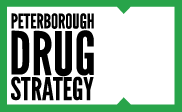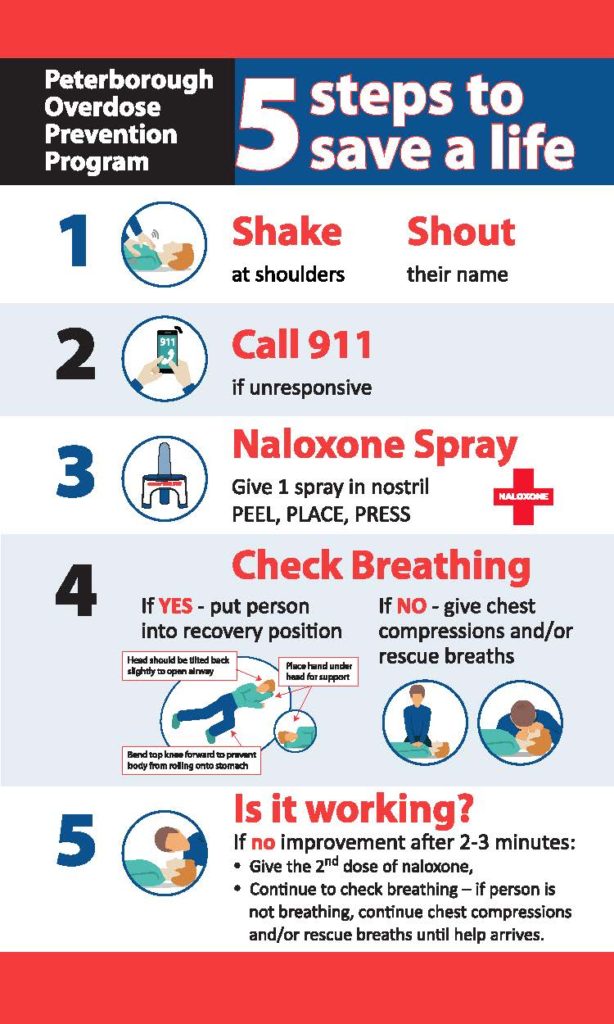Opioid Overdose Response & Naloxone
Signs of Opioid Overdose
- Can’t wake the person up
- Breathing is very slow, erratic or has stopped
- Deep snoring or gurgling sounds
- Fingernails or lips are blue or purple
- Body is very limp
- Pupils are very small
5 Steps to Overdose Response
Call 911
Calling 911 is the most important part of responding to overdose. Even if the individual wakes up with naloxone, they still need medical attention. There are circumstances of individuals falling back into an overdose after the naloxone wears off.
Sometimes there are concerns about charges being made because of activity happening at the site of the overdose. Good Samaritan legislation does protect you in some circumstances. If you need legal help, call Legal Help Ontario 1 (800) 668-8258.
| The law DOES provide protection against charges for: | The law DOES NOT provide protection against charged for: |
| Possessing drugs for your own use | Selling illegal drugs (trafficking): Police may suspect this if you have a large amount of drugs, cash or items like scales, baggies, and debt lists |
| Offenses other than drug possession | |
| Violating conditions of your parole, bail, probation or conditional sentence for a simple drug possession charge | Any outstanding arrest warrants |
| Violating conditions of your parole, bail, probation or conditional sentence for an offense that is not simple possession |
* Information from this chart comes from http://yourlegalrights.on.ca/sites/all/files/WalletCard_FINAL.pdf
The Peterborough Police Service remains committed to saving lives during an overdose, not laying charges.
“We cannot arrest our way out of addictions” – Peterborough Police Chief Murray Rodd, 2018
Naloxone
Naloxone is used as an antidote to opioid overdose. Opioids (such as morphine, heroin, methadone, oxycodone, and fentanyl) can slow or halt breathing and result in unconsciousness. The administration of naloxone can reverse these effects and prevent brain damage or even death.
Research shows that with minimal training, people with no medical background can recognize and treat an overdose with naloxone. Additionally, individuals are empowered by the ability to save a life and programs like this help reduce stigma towards people who use drugs matter. The use of Naloxone does not replace the need for emergency medical care but instead it prolongs the time that the individual has before long-term effects are irreversible.
Naloxone Overdose Prevention Kits are an evidence-based approach proven to have positive benefits and are sought after by our communities. In order to effectively treat opioid addiction, we must help ensure that the individuals who use opioids are alive to receive treatment.
Where do I find a Naloxone Kit?
- How to access naloxone in Peterborough (PDS and PPH, 2023)
- Where individuals in Ontario can access naloxone in their community
Learn more about Naloxone
- All About Naloxone (Ontario Ministry of Health and Long-Term Care)
Overdose Response Myths
Do Not |
Why? |
| Put the person in a bath/cold water | Could drown or put them into shock |
| Make the person throw up | Could choke |
| Inject them with anything other than naloxone | Will not help and could cause more harm |
| Slap too hard, kick them in the testicles, burn the bottom of their feet | Could cause serious harm |
| Let them sleep it off | Could stop breathing and die |

